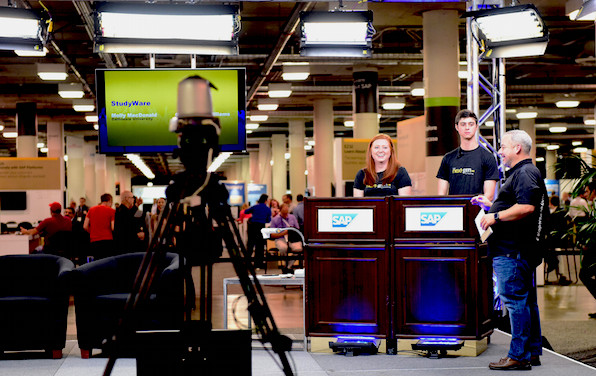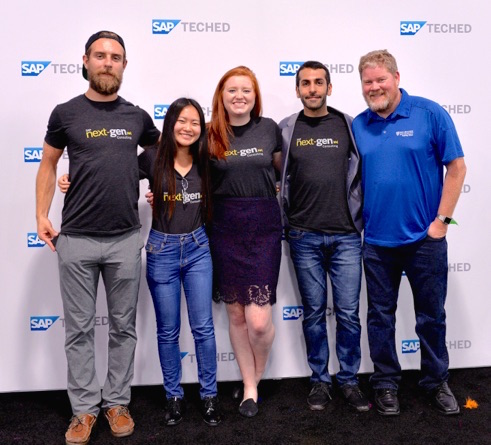News
» Go to news main║┌┴╧│╘╣╧═Їstudents make a splash at SAP TechEd

Molly MacDonald (left) makes the presentation on behalf of her team
╠¤
In Las Vegas last month, 6,000 people gathered for an annual global conference showcasing the latest in business technology. Of these 6,000, a mere ten were university students. Of these ten, four were from Dalhousie.
╠¤тАЬWeтАЩre at the pinnacle here,тАЭ says Dr. Michael Bliemel, professor of management information systems and coordinator of the SAP initiative in the Rowe School of Business. SAP is a software corporation with headquarters in Germany that specializes in enterprise technology with a variety of applications. It hosted SAP TechEd in Las Vegas, drawing personnel from a variety of industries from around the world. The event boasts hundreds of workshops, showrooms and presentations. RSB students Dustin Shreeve, a BComm graduate and Master of Electronic Commerce student; Molly MacDonald, a BComm student; and Ali Kazerani and Connie Zheng, both completing their MBA studies, traveled with Bliemel to the Vegas conference.

(L to R) Dustin Shreeve, Connie Zheng, Molly MacDonald and Ali Kazerani, with faculty advisor Dr. Michael Bliemel
╠¤
Various circumstances combined to propel the four students to SAP TechEd. Chief among them, says Bliemel, is the existence of the TIME department (Technology, Innovation Management and Entrepreneurship) in the Rowe School. тАЬWe have a group that covers both entrepreneurship and enterprise systems,тАЭ he says. тАЬBecause of that strong connection on both sides, our students were invited to represent the SAP University Alliance in general.тАЭ Bliemel serves on the Alliance board, fosters student knowledge of SAP software and notes that the Rowe School has just started a SAP NextGen consulting club. тАЬNextGen is an initiative to bring students into enterprise systems and foster innovative thinking,тАЭ he explains. тАЬThese students work on new initiatives and products that are useful for industry.тАЭ
At TechEd, innovative thinking is just what the Rowe students needed. They competed in InnoJam, a competition that challenged 13 teams to develop software that meets a particular need in the education system. The RSB students were divided into two teams, and were joined by students from Indiana and Penn State, the other invited universities. Six of the 13 teams made it to the finals, DemoJam, where each team had just six minutes to present its software to an audience of senior SAP executives and industry professionals. This audience voted for the winners.
Both of the teams with ║┌┴╧│╘╣╧═Їstudents were finalists, and one placed second in the overall competition. That may seem impressive, but Bliemel explains just how impressive it was: the two teams that involved ║┌┴╧│╘╣╧═Їwere the only student teams. тАЬAll of the others were composed of experienced IT professionals, programmers and consultants,тАЭ says Bliemel. тАЬThe fact that the students almost won was just incredible. They blew away our expectations.тАЭ
MacDonald and Zheng were part of the second-place team. Their challenge was to create a way for students to use wearable technologyтАФsuch as FitbitsтАФto enhance their education. The team of five students used a tool called SAP Build to create тАЬStudyWare,тАЭ an app that allows students to track everything from absences to exam scores to timetables on a Fitbit. Finishing their presentation with three seconds to spare, the students made an obvious impression on the judges.
The other finalist student team, which included Shreeve and Kazerani, used SAP Build to improve the efficiency of room-booking systems on campus. In InnoJam, coders have an obvious advantage because they know how to create programs; the team that placed first, Bliemel says, was a group of IT professionals from the UK who have won the competition five years in a row. Bliemel explains that the Build tool enables those without computer programming or coding experience to create a functioning prototype of a software program or app. тАЬHaving business students compete is really made possible by SAP Build,тАЭ says Bliemel.
And bringing on business students means new possibilities: тАЬThe thing that business students can do better,тАЭ explains Bliemel, тАЬis figure out what the problem is and come up with an innovative solution.тАЭ
Aside from the InnoJam competition, the students spent time at the event volunteering and meeting high-level SAP personnel, including Jeff Word, SAPтАЩs Vice-President Product Innovation, who interviewed the ║┌┴╧│╘╣╧═Їstudents for his podcast. Between the publicity of DemoJam and the opportunity to meet industry professionals, the conference seems to have been time well spent for Kazerani, MacDonald, Shreeve and Zheng. тАЬThe students made a strong impression on people in industry there,тАЭ says Bliemel. тАЬWe really got the message out that universities like ║┌┴╧│╘╣╧═Їare training the next generation of innovators.тАЭ
Recent News
- Celebrating 20,000 Business Work Terms: Jamie McGuiganтАЩs Journey from ║┌┴╧│╘╣╧═ЇStudent to Scotiabank Leadership
- Q and A with Alison Brown: The twists and turns which led her to Information Science
- The Bachelor of Management is 25!
- From MBA classroom to the frontline of healthcare
- Yirun Wang (BMgmtтАЩ24) builds a community while earning his degree
- Alum finds ways to have a big impact on health and students
- Building a path forward with work integrated learning
- Two exciting milestones, one amazing Dal Business Networking Night
